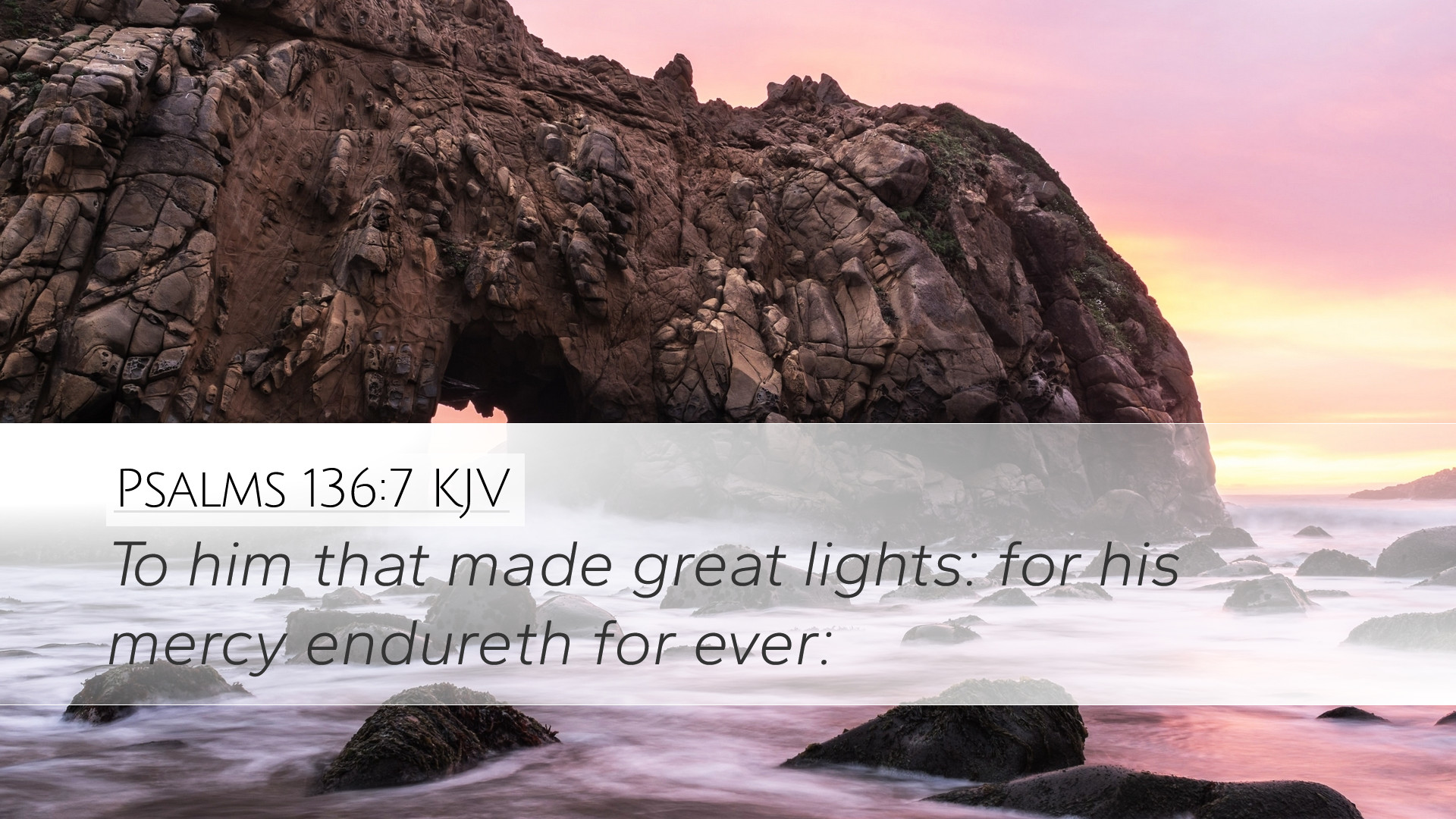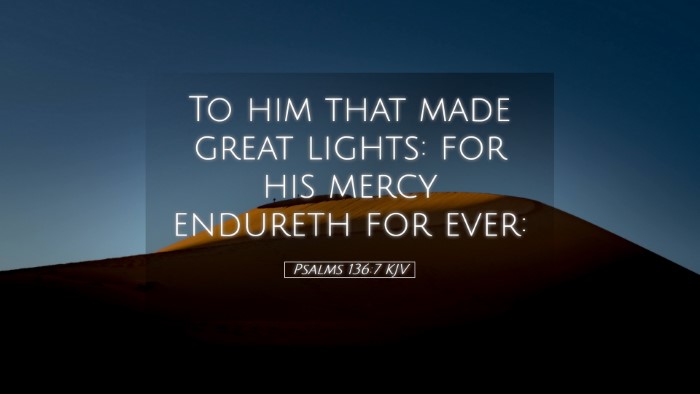Bible Commentary on Psalms 136:7
Psalms 136:7: "To Him who made great lights, for His mercy endures forever."
Introduction
This verse is part of a grand psalm that celebrates the enduring mercy of God, weaving a tapestry of creation, history, and continual divine favor. The mention of "great lights" encapsulates God's creative power in the heavens, showcasing His ability to bring order and beauty to the universe.
Both inspiration and reflection are elicited through the acknowledgment of God as Creator, an essential truth for pastors, students, theologians, and Bible scholars. This commentary seeks to unify insights from various public domain sources, detailing the theological implications and applications of this verse.
Exegesis of Psalms 136:7
In examining the phrase "To Him who made great lights," we recognize an allusion to God's creation as described in the Book of Genesis. The "great lights" refer primarily to the sun and the moon. This not only highlights His creative authority but also signifies the sunlight that illuminates our days and the moonlight that gently graces the night, representing guidance and provision.
Theological Insights
Matthew Henry notes that this verse emphasizes God's mercy as fundamental to His creative acts. The mention of the "lights" invites a reflection on the broader theme of creation as an expression of God's favor and kindness toward humanity. Each creative act is infused with mercy, reminding us that His creation serves a purpose beyond mere existence.
Albert Barnes also highlights the mercy of God in creation. He states that God’s persistent assurance of mercy, which is invoked repeatedly in this psalm, indicates a foundation on which we can rest our faith. God's creation is intentionally designed to reflect His steadfast love and dedication to His people.
Adam Clarke further expounds that the great lights mentioned here can be seen not only in their physical aspect but as symbolic representations of illuminated knowledge and moral truth bestowed upon mankind. In this light, the "great lights" also symbolize the guidance God provides through His word and via the sun, which is essential for life and growth.
Diegesis of Great Lights
The term "great lights" particularly signifies two key entities:
- The Sun: A direct representation of God's authority over the day; it is vital for physical sustenance and agricultural success.
- The Moon: Symbolizing tranquility and night, also serving as a guide for the wayfarer, thus underscoring God's attentiveness through the darkest times.
Both serve as reminders of God’s providential care and the cyclical nature of creation, reflecting His unchanging character amidst the changing seasons and times.
Application for Believers
The continual refrain of God's mercy in Psalms 136 is an encouragement for believers to acknowledge the Creator's sovereignty and compassion in their lives. In a world often filled with uncertainty, this verse serves as a reminder that both creation and our existence are underpinned by God’s mercy.
Pastors and church leaders can draw from this psalm to inspire congregations to appreciate the world and its wonders as manifestations of divine love. This overt recognition leads to a worshipful attitude that cultivates gratitude.
For students and theologians, such reflections prompt deeper study into the interrelationship between creation and the divine mercy. Engaging with texts surrounding creation not only informs one’s theological foundations but enriches personal faith.
The Enduring Nature of God's Mercy
The repetition of “for His mercy endures forever” serves as a powerful conclusion to each segment of this psalm. It encapsulates the essence of God’s character—mercy is not a fleeting attribute but a lasting promise. This reassurance can be particularly poignant for individuals grappling with their faith, highlighting that regardless of circumstance, God’s mercy is a constant.
As Adam Clarke elaborates, understanding mercy within the framework of creation instills a sense of hope. Each dawn is a testament to God's unyielding compassion, reminding us that His creative power is accompanied by His ongoing desire for relationship and reconciliation with humanity.
Conclusion
In summary, Psalms 136:7 encapsulates a profound theological truth about the nature of God as the Creator of "great lights" and a God whose mercy endures forever. The insights gleaned from Matthew Henry, Albert Barnes, and Adam Clarke collectively emphasize the importance of acknowledging God’s creative acts as a reflection of His benevolent heart.
This verse serves as both a call to worship and a reminder of the constant mercy available to all believers. As we explore the depths of divine mercy illustrated through creation, we are challenged to respond with gratitude, trust, and a renewed commitment to glorify the Creator.


